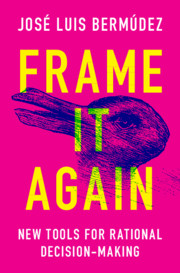Book contents
- Frame It Again
- Frame It Again
- Copyright page
- Contents
- Figures
- Tables
- Acknowledgments
- 1 Priming the Pump: Framing Effects and the Litany of Human Irrationality
- 2 Framing: The Classic Experiments
- 3 Where the Rubber Hits the Road: Investors, Frames, and Markets
- 4 Juliet’s Principle
- 5 Rational Frames?
- 6 Agamemnon and Climate Change
- 7 Framing Temptation and Reward: The Challenges of Self-Control
- 8 Chickens and Chariot Races: Framing in Game Theory
- 9 Fair’s Fair: Framing for Cooperation and Fairness
- 10 Getting Past No: Discursive Deadlock and the Power of Frames
- 11 Opening the Door to Non-Archimedean Reasoning
- Appendix Frames in the Brain
- Bibliography
- Index
9 - Fair’s Fair: Framing for Cooperation and Fairness
Published online by Cambridge University Press: 15 October 2020
- Frame It Again
- Frame It Again
- Copyright page
- Contents
- Figures
- Tables
- Acknowledgments
- 1 Priming the Pump: Framing Effects and the Litany of Human Irrationality
- 2 Framing: The Classic Experiments
- 3 Where the Rubber Hits the Road: Investors, Frames, and Markets
- 4 Juliet’s Principle
- 5 Rational Frames?
- 6 Agamemnon and Climate Change
- 7 Framing Temptation and Reward: The Challenges of Self-Control
- 8 Chickens and Chariot Races: Framing in Game Theory
- 9 Fair’s Fair: Framing for Cooperation and Fairness
- 10 Getting Past No: Discursive Deadlock and the Power of Frames
- 11 Opening the Door to Non-Archimedean Reasoning
- Appendix Frames in the Brain
- Bibliography
- Index
Summary
Michael Bacharach has shown how framing is a powerful tool for reconceptualizing game theory. There are different ways of framing strategic interactions. One way is to frame them individualistically, in the “I”-frame. Agents reasoning in the “I”-frame pay attention only to their own pay-offs. They seek to identify best response strategies. Best response strategies produce the best outcome for the agent, whatever other players end up doing. When each player plays a best response strategy then we have a Nash equilibrium, which is a situation where nobody can benefit from changing strategy. Nash equilibrium is the solution concept for game theory considered within the “I”-frame.
- Type
- Chapter
- Information
- Frame It AgainNew Tools for Rational Decision-Making, pp. 192 - 214Publisher: Cambridge University PressPrint publication year: 2020

